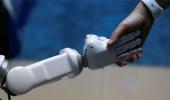'The government must quickly look at creation of innovation clusters for automation and robotics, identify skills employers will value in future and promote cloud infrastructure capacity,' says Shyamal Majumdar.
Illustration: Dominic Xavier/Rediff.com

The mere mention of artificial intelligence sets off diametrically opposite reactions these days: While many say AI will lead to job augmentation and not job displacement, others vouch for the fact that countries such as India are in for an extended period of social turmoil, with machines taking away jobs.
Those in the first camp give the example of e-commerce, which eliminated many retail jobs but created a lot of courier jobs. It has resulted in voluntary skill upgrade, too.
For example, look at the drivers in the shared taxi service space. They have learnt on their own to use GPS to find locations, which is an increase in their skill level compared to that in the past.
Research from the McKinsey Global Institute has concluded that, indeed, the application of technologies will force millions of workers to acquire new skills, as the jobs they perform are rendered obsolete.
Yet, rapid advancements in the same technologies will create new opportunities for millions of workers, including many less-skilled ones.
Some in this camp also believe that as long as machines are unable to think, there is no alternative to humans at work, though this question of whether machines can think is about as relevant as the question of whether submarines can swim.
For example, a British artificial intelligence company recently made news for its computer program, AlphaGo, which made history in defeating the world champion in a game called Go.
In 2011, Watson, created by IBM based on AI/cognitive-computing that acts like a human and can answer questions posed in a natural language, defeated humans on the quiz show Jeopardy!.
On the other hand, believers in potential social turmoil have a completely different take. One of them is Jerry Kaplan, an American computer scientist and futurist.
In his provocative book, Humans Need Not Apply, Kaplan paints a picture of an apocalyptic future and what it might look like, if and when machines take over.
A Bank of America Merrill Lynch study has set the tone by saying that several countries are approaching the crucial inflection point when it would be 15 per cent cheaper to use a robot than to employ a human worker.
The report also says robots are expected to perform 45 per cent of manufacturing tasks worldwide by 2025, up from around 10 per cent now.
Take the example of IBM, which is also offering a text-to-speech engine, that provides responses in a correct tone.
When callers are angry, for example, the engine will not answer back in an upbeat voice. Think about the impact this would have on call centre employees.
There is more. For instance, the future of teaching as a profession. As Kaplan says, technologies can replace teachers in a wide variety of settings.
The current buzzword for this is the flipped classroom -- students watch lectures and learn the material online at home, then do their homework at school with the help of teachers and teaching assistants.
Teachers may no longer need to prepare or deliver lectures, reducing them to what could be called 'learning coaches'. The diminished skill set required is sure to transform the profession and create yet more challenges for teachers.
Even as this debate goes on, the least India can do is to have a cogent policy to drive AI innovation.
There are two issues here: The first is the education system and the second involves skills and jobs.
While discussing the likely impact of AI on labour markets, Kaplan poses the radical question: Is the current system of sequential education and work outdated, as the nature of jobs shifts rapidly and skills become valuable and obsolete in a matter of years?
The government has to quickly look at creation of regional innovation clusters for manufacturing automation and robotics in partnership with universities and start-ups, incorporate systems for identifying the kind of skills that employers will value in the future and promote cloud infrastructure capacity.
China has already taken a giant leap. It has commissioned a private firm to lead the charge in setting up an online national engineering laboratory to implement deep learning technologies in collaboration with universities and research institutes.
China recently issued guidelines on AI development wherein it aims at becoming a global innovation centre in this field by 2030 with an estimated total output value of AI industries at $148 billion.
India should wake up before it's too late.











